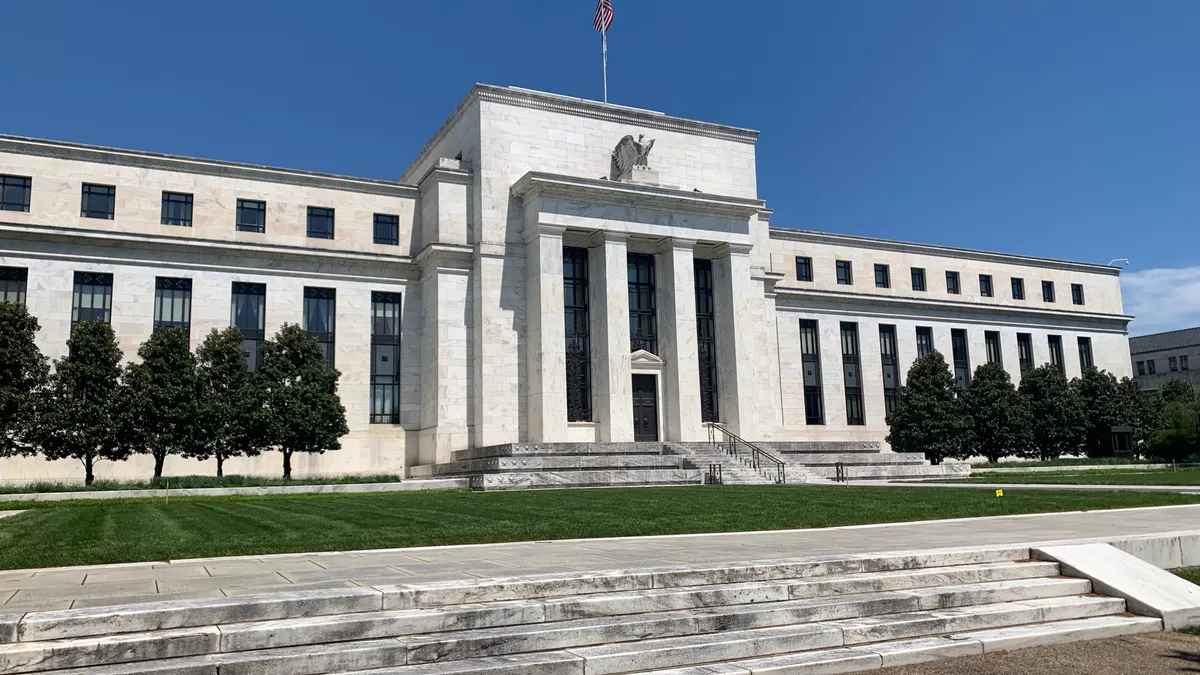Dive Brief:
- The Federal Reserve on Wednesday defended its move to allow BNY Mellon to launch a crypto-asset custody service and disputed allegations of favoritism levied by Wyoming-based Custodia Bank.
- The crypto-focused bank, which is suing the regulator over claims it is delaying its application for a Fed master account, said the Fed’s embrace of BNY Mellon’s crypto venture is an example of the regulator favoring an incumbent financial institution.
- Custodia’s complaint, however, ignores "substantial differences" between the two banks’ business models and plans, the Fed said in a court brief. The two entities, the Fed added, are also not subject to the same supervision requirements.
Dive Insight:
“The Federal Reserve expects to address any safety and soundness or other issues with BNYM’s digital asset custody services through the supervisory process,” the regulator wrote in its brief. “The same is not true for Custodia, a novel depository institution prohibited under Wyoming law from engaging in the traditional banking activity of lending, exempt from Wyoming’s requirement that banks obtain deposit insurance, and not at this time federally regulated.”
Custodia’s lack of federal regulation makes it more difficult for the Fed to monitor and assess, the central bank wrote in the brief.
The Wyoming-based bank also proposes to do more than the limited custody services announced by BNY Mellon, the Fed said, calling Custodia’s crypto plans “complex and novel.”
“Custodia intends to use its balance sheet to conduct certain activities as principal — including issuing the ‘Avit,’ a balance sheet liability of Custodia that would be a ‘tokenized, programmable U.S. dollar,’” the Fed wrote. “Further, Custodia has made no representation that it will not hold cryptocurrency in a principal capacity … an activity that is outside the scope of conventional custody services, but is arguably required by Wyoming law.”
The bank’s crypto ambitions “present substantial risks and complexities requiring careful and diligent review,” the Fed added.
In its original June complaint, however, Custodia said it plans to hold all customer deposits of U.S. dollars in cash in a Fed master account, adding it plans to hold no digital assets for its own account.
“This means that Custodia will not be exposed to the volatility of digital asset prices because it will hold all digital assets in bailment on behalf of a customer in its trust department,” the bank wrote. “In other words, granting Custodia a master account would not expose the Federal Reserve System to any digital asset risk, as Custodia would only handle U.S. dollars in its master account and Custodia’s trust customers would retain all digital asset risks.”
Custodia, formerly known as Avanti, was granted a special-purpose depository institution (SPDI) license in Wyoming in 2020, and says it has been waiting 2½ years for the Fed to approve its application for a master account.
The approval, Custodia said, will allow it access to the Federal Reserve’s banking system for clearing U.S. dollar transactions without having to use an intermediary bank.
“The Federal Reserve is saying one thing to federal judges and another to Wall Street,” Nathan Miller, a spokesperson for Custodia Bank, said in response to the Fed’s brief. “On one hand, the Fed frets about ‘novel risks’ of allowing depository institutions like Custodia to provide custody for digital assets while, on the other, it lets the nation’s oldest depository institution, BNY Mellon, beat all the innovators to market — despite disclosing that it did not even start building until a full year after Custodia had already applied to the Fed. The Fed is slowing down innovators to help incumbents, while the public pays the price in higher bank fees and longer wait times for money to move.”
BNY Mellon’s crypto announcement spurred a strong reaction from Custodia Bank CEO Caitlin Long, who, while participating last week on a DC Fintech Week panel, said the move showcased the regulator’s lack of consistency.
“Look at what the Fed actually said last week versus what it did today,” Long said, referencing a report the Fed released last month in which it warned of the risks and challenges digital assets pose to the financial system.














